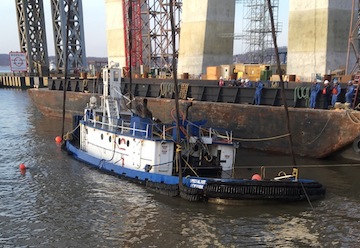The following is the text of a news release from the U.S. Coast Guard:
(NEW YORK) — The official Coast Guard investigation into the sinking of the tug Specialist on March 12 near the Tappan Zee Bridge is months away from completion.
The length of time that is required to produce a thorough examination is not unusual. Almost without exception, months of painstaking work are required for any investigation. There are no short cuts when it comes to producing a comprehensive investigation that reaches reasoned conclusions on the cause of the accident as well as making appropriate safety recommendations to prevent future mishaps.
This is a process for which the Coast Guard is ideally suited. With decades of experience and thousands of sinkings investigated, the Coast Guard leads the way on dozens of these cases nationwide every year. The tug Specialist is a case in point.
“This is a major marine casualty,” said Lt. Cmdr. Eric Rivera, chief of investigations, Coast Guard Sector New York. “It is the total loss of a commercial vessel of more than 100 gross tons. In addition, we have loss of life, which adds a layer of complexity.”
Coast Guard investigation reports have national and, in some cases, international implications. Many such investigations have led to Congress enacting legislation to enhance safety of life at sea. For this reason, a Coast Guard investigation can never be hurried.
“Our investigations are a search for the truth,” said Rivera, “wherever that takes us and however long it takes us to get there.”
In the course of investigating the loss of the tug and the death of the vessel’s three crewmembers, the Coast Guard will examine a literal host of factors to include but not limited to:
• Physical evidence from the salvaged vessel
• Photographs and digital recordings of the last voyage and the sinking
• The medical examiner’s report on cause of death
• Toxicology reports on the crewmembers
• Witness interviews
• Electronic evidence (such as the GPS recorder on the vessel)
• Owner’s records
• Coast Guard records on the vessel, the crew and the owner
• Licenses, credentials and qualifications of the crew
• Physical factors — weather, tides, currents, traffic on the river, etc.
Fortunately Coast Guard investigators are able to call on the services of trusted agencies that have competence in investigations, though not necessarily specialized knowledge in dealing with marine casualty cases. In the Specialist investigation, the Coast Guard has had the ongoing assistance of the Coast Guard Investigative Service, the state of New York, the National Transportation Safety Board and the Westchester County Police Department.
Because the accident happened within sight of the town of Tarrytown in Westchester County, local law enforcement has been a contributor to this ongoing investigation.
“Westchester Police Department has played an important role in the Coast Guard investigation,” said Rivera. “Due to their proximity and their ability to provide physical space for evidence storage, we have relied on them for handling and compiling the physical evidence.”
Once the Coast Guard report is completed, it passes up the Coast Guard chain of command to Headquarters in Washington, D.C. The Investigations Branch, with some of the service’s top investigators, will thoroughly vet the report, re-examining any evidence if necessary. Of particular focus will be the recommendations contained in the report. These are of great interest because of their implications for changes to the maritime industry.
Although this case is unlikely to result in sweeping legislation, such has happened.
Following the calamitous Exxon Valdez oil spill in 1989, Congress passed the Oil Pollution Act of 1990. Among other preventive measures mandated, the law required that oil tankers operating in U.S. waters be double hulled for safety. This is a regulation that became international and has even been applied to the tug and barge industry, where all oil carrying barges must now be double hulled.
Following the even more disastrous Deepwater Horizon spill of 2010, drilling practices in U.S. waters were significantly modified and a new watchdog agency for offshore drilling was created.
But regardless of the consequences, the Coast Guard report will be thorough and complete, even though the process takes months.

